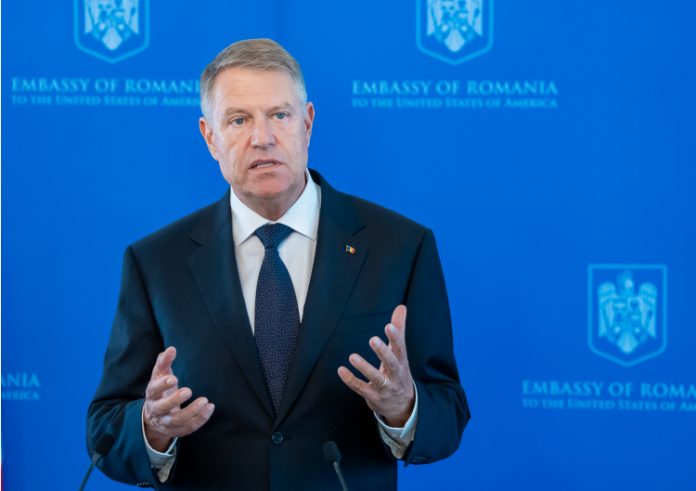President Klaus Iohannis drew attention on Thursday, at the European Council meeting, to the intensification of Russian hybrid attacks aimed at undermining democracies through disinformation, malicious cyber activities, and manipulation via social media, particularly in electoral contexts, bringing to mind the elections in Romania and in the Republic of Moldova.
He stressed that these attacks are not directed only at a single country but at democratic societies in general and at the way of life based on values, rights, and freedoms, the Presidential Administration points out.
In this context, Klaus Iohannis informed EU leaders about recent developments in Romania, in the context of the presidential elections, and conveyed a firm message regarding respect for democratic values and the pro-European path, with Romania continuing to be a stable and responsible country.
Thus, the President of Romania called for effective coordination at the EU level on the issue of combating foreign interference by developing effective tools and mechanisms to counter these increasingly present phenomena, with the theme of combating Russia’s interference and hybrid activities being included in the final Conclusions text at Romania’s request.
Regarding the decision to lift border controls and finalise Romania’s and Bulgaria’s accession to Schengen, the Conclusions of the European Council welcomed its adoption. In this context, President Klaus Iohannis thanked the other EU leaders for their support in adopting this decision and reiterated Romania’s commitment to remain a dedicated and proactive partner in strengthening the EU’s internal security, as well as its external border security.
Concerning Ukraine, discussions focused on Russia’s aggression against Ukraine in all its dimensions, as well as the continued comprehensive support from the Union for Ukraine. The EU’s support for the principles and key objectives of the Peace Formula proposed by President Zelenskyy was reaffirmed, emphasising the importance of ensuring that no international peace initiative be advanced without Ukraine’s involvement. Likewise, the EU must remain closely involved in all matters concerning Europe’s security, according to the Presidential Administration.
In this regard, President Iohannis reconfirmed Romania’s support for Ukraine on all relevant fronts, particularly concerning defence and energy needs. Regarding potential peace negotiations, the Romanian head of state underscored the necessity for these to be based on fair and just principles, respecting international law and Ukraine’s position as a victim of this illegal and unprovoked aggression.
At the same time, Klaus Iohannis drew attention to the issue of energy security for the Republic of Moldova, which, alongside Ukraine, faces increasingly serious challenges in this regard, amid Russian aggression. President Klaus Iohannis also advocated for maximising bilateral support for these two countries, together with European and international partners.
He also highlighted the need to continue supporting the resilience and stability of the Republic of Moldova, as well as its reform efforts on its European path, including through the implementation of the Moldova Growth Plan and the swift adoption of the Reform and Growth Facility. Furthermore, the adopted Conclusions refer to the need to strengthen support for the Republic of Moldova on the crucial issues mentioned, including energy security.
EU leaders discussed the situation in the Middle East, welcoming the ceasefire agreement of November 27 between Israel and Lebanon and reiterated calls for the parties involved to implement it. At the same time, they renewed the call for a ceasefire in the Gaza Strip and for the release of all hostages, as well as improved access to humanitarian aid. European leaders reaffirmed their commitment to international law and the two-state solution.
The President of Romania advocated for a unified, firm, and coordinated positioning that would allow the EU to contribute to resolving these crises in accordance with international law and multilateralism principles. In this context, he pointed out that the European Union can strengthen its role as a mediator in the region and as a defender of human rights in a broader sense.
Regarding the situation in Syria, Klaus Iohannis reiterated Romania’s support for the EU policy on the return of Syrian refugees, which must be voluntary and in safe conditions. He also noted the need for a political solution in Syria that includes a peaceful power transition to a responsible government that protects Syria’s sovereignty, unity, and territorial integrity.
The head of state encouraged maintaining a constructive approach to migration management, focusing on monitoring progress in border protection and strengthening the external dimension of migration. He also underlined that migration remains a common challenge that must be addressed through enhanced cooperation and decisive measures that have produced positive results so far by reducing illegal migration and asylum requests. At the same time, he noted that Romania can support an early implementation of the Migration and Asylum Pact on certain aspects, taking into account a fair balance between responsibility and solidarity.
Klaus Iohannis mentioned that enlargement policy, one of the EU’s most important policies, must continue, including by considering the opportunities offered by the current framework. He reiterated support for the ambitions of partners to advance their EU accession processes at an accelerated pace, respecting the principle of merit. In this context, he also mentioned support for the objective of opening Cluster I negotiations with the Republic of Moldova and Ukraine as soon as possible.
European leaders reiterated the importance of increasing preparedness, prevention, and response to crises, in the context of an evolving threat landscape. The importance of improved and coordinated military and civil preparedness was also highlighted, within an approach that considers risks on all relevant levels.
The President of Romania reaffirmed the importance and urgency of strengthening the EU’s action capacities in this area as Union priorities, also in the context of the growing number of natural disasters caused by climate change.
Klaus Iohannis also advocated for the need for consolidated and coordinated preparedness for the strategic management of crises at the level of society as a whole, respecting the competences of member states and in synergy with NATO, as well as for a realistic level of ambition and prioritisation of initiatives in this area, which require urgent funding.
AGERPRES




